Mujibul Alam Khan
南亞三分之一人口是穆斯林。2014年7月,全球穆斯林集體齋戒,從曙光出現到落日前禁絕飲食。在「見月封齋,見月開齋」整整一個月裏,伊斯蘭社會的生活作息,從飲食、社交、經濟到政治活動,以齋戒為中心發展出獨特的樣貌。本文作者以孟加拉為例,在齋戒月即將進入尾聲之際,深入淺出介紹當地齋戒的各個面相,齋戒月獨有的美食與可笑的政治生態,是本文兩大特色。
- RAMADAN : The month of fasting and feast of Muslims in Bangladesh
The constitution of Bangladesh guarantees the rights of the people to freely practice their faiths. The four largest religions in the country are Islam, Hinduism, Buddhism and Christianity.
Islam was introduced to the Bengal[1] region during the 7th century by Arab Muslim traders and Sufi missionaries. The spread of Islam in Bangladesh began through Sufism with the arrival of Shah Jalal ad-Din al-Mujarrad al-Yamani, a Sufi Muslim from Yemen, in Sylhet[2] in the year of 1303.
- The five pillars of Islam
The five basic acts which are mandatory for Muslims are considered as the ‘Five Pillars of Islam’.
1. Sahadah: Declaring the oneness of Allah (God) and Muhammad[3] (peace be upon him) is the last messenger and prophet sent by Him
2. Salat: Obligatory five prayers a day
3. Zakat: Alms giving to the needy, to help fellow Muslims in economic hardship
4. Sawm: Fasting and self-control during the month of Ramadan
5. Hajj: Pilgrimage to Mecca at least once in a lifetime for the physically fit and financially sound Muslims.
- Ramadan
Ramadan is the ninth month of the Islamic calendar. It is considered a sacred month when Muslims around the world observe fasting for 29 or 30 days depending on the sighting of crescent moon.
As is stated in the Quran[4] : “The month of Ramadan [is that] in which was revealed the Quran, a guidance for the people and clear proof of guidance and criterion. So whoever sights [the new moon of the month], let him fast it; and whoever is ill or on a journey – then an equal number of other days. Allah intends for you ease and does not intend for you hardship and [wants] for you to complete the period and to glorify Allah for that [to] which He has guided you; and perhaps you will be grateful.”[5]
- Fasting
Fasting is compulsory for Muslims to start when they reach puberty and continue as long as they are healthy and sane, and have no disabilities or illness. From dawn to sunset they abstain from eating and drinking, sexual relations and generally sinful speech and behavior.
Fasting is not compulsory for the sick, frail, elderly, and women who are lactating, pregnant and menstruating. Those who are unable to fast during Ramadan need to make up the days they miss later.
- Tarawih
Ramadan is not only a month of fasting but also for making more prayers in addition to the five payers a day. At the end of Isha[6] an additional prayer called Tarawih is prayed until the second last day of Ramadan to express profound obedience to Allah the Almighty and seek His blessings. Tarawih prayers consist of 12 rakats[7] and are prayed in pairs of two.
The process of fasting helps cleansing the soul by freeing it from desire of worldly pleasures. Ramadan is a great opportunity for Muslims to practice self-control, sacrifice, and empathy for the poor and needy.
- As fasting begins in Bangladesh
‘Wake up, it’s time for Sehri, wake up!’ is the call comes from local mosque or by a caller employed by the community around 2:30 or 2:40 in the early morning.
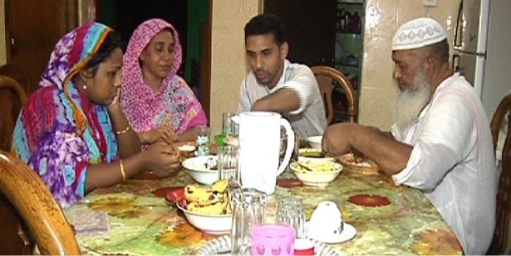
(Sehri at home)
Sehri is the food and drinks taken before dawn to begin fasting for the day.
The same caller makes the warning call 15 or 10 minutes before the deadline of Sehri, ‘The time for Sehri is over! Stop eating and drinking; prepare for the Fajr[8] prayer…the time for Sehri is over!’ around 3:30 – 3:40 early in the morning.
In the city areas, a siren will blow from the mayor’s office to remind the time of the beginning, and end of Sehri.
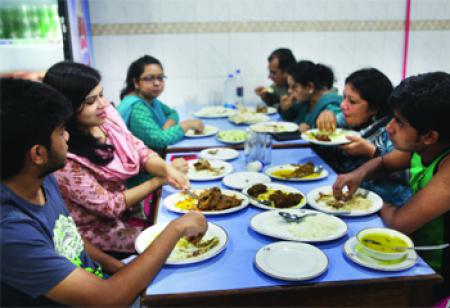
(Sehri in the restaurant )
Sehri is always the traditional daily meals, consisting of rice, vegetables, fish and/or meat and green salad while homemade lemonade, milk tea and/or fruit juice are served as drinks. Almost everyone eats Sehri at home.
Some restaurants in the capital city Dhaka and port city Chittagong are serving Sehri since last few years. It’s a great opportunity for people, who eat Sehri out, to enjoy the wide range of Bangladeshi cuisine. A family’s Sehri outing is indeed a ‘double benefit’ to the mother or the wife since it provides them a break from the arduous work – cooking in the early morning. Some restaurants in Dhaka and Chittagong are famous for serving decade old local delicacies which nowadays are no longer prepared at home.
Sehri is usually taken in between 2 am until 20 minutes before Fajr prayer.
- Some Sehri Items
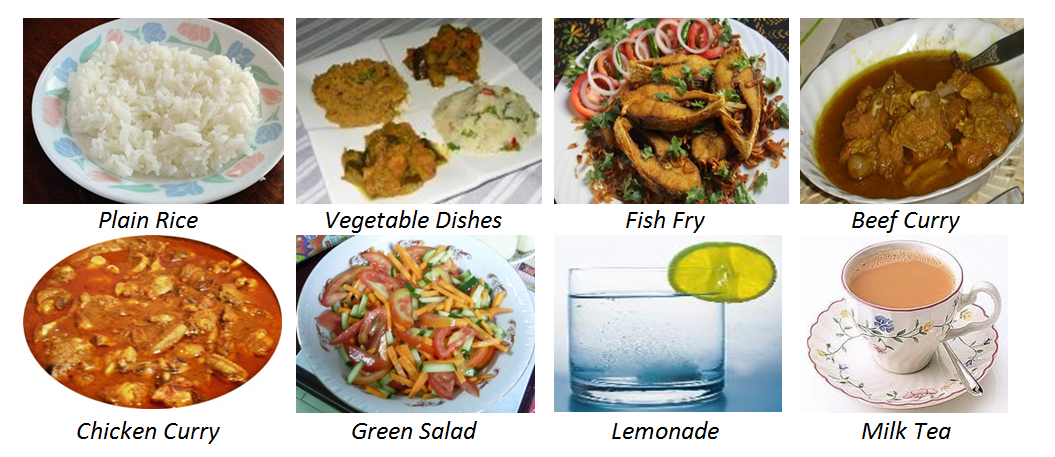
- Breaking the fast: Time to rejoice!
In the dead hour of the afternoon and before the evening casts its shadow over the earth, the air is filled with the melodious voice of the caller from the mosque, “Allah-Hu-Akbar, Allah-Hu-Akbar!”, it is time to pray Maghrib[9] (and from the city mayor’s office the siren blows again to alert people) – it is time to end fasting.
There is the rush for a drink now; satisfy the thirst first! It is about 15 hours ago, or even more, the last drink and the first meal was taken (most breaks their fasting with a glass of water). With or without a few bites of snacks the devotees take a break for 10 to 15 minutes to offer the Maghrib prayer.
Once the prayer is complete; it is time to enjoy Iftar – it is time for feast!
- Iftar
- Iftar items in rural Bangladesh – traditional and homemade
.png)
- The urbanites’ favorite – home and beyond
Although most of the city-dwellers in Bangladesh still prefer to prepare all meals at home in the month of Ramadan, there is growing trend among them of buying food from prominent restaurants and food stalls that especially operate during the Ramadan to sell Iftar items only or one specific item for which they have earn a reputation in recent time.
Indeed there are cuisines prepared by restaurant chef better than the queen of the kitchen in the house. However, the reasons behind the recently growing trend of city dwellers’ Iftar shopping are quite extra-ordinary: Among others, two most important factors are power shortage, and disruption of gas supply.
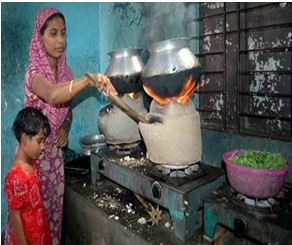
Even the lower middle-class families feel comfortable to buy from the market, although the items are costly, as it saves them from tormenting waiting hours for power and/or gas supply. (Picture on the left shows a woman cooking with firewood in earthen oven during interrupted gas supply)
- Mouth-watering and tongue twisting (and belly belching) feast!
Starter

Main Dish
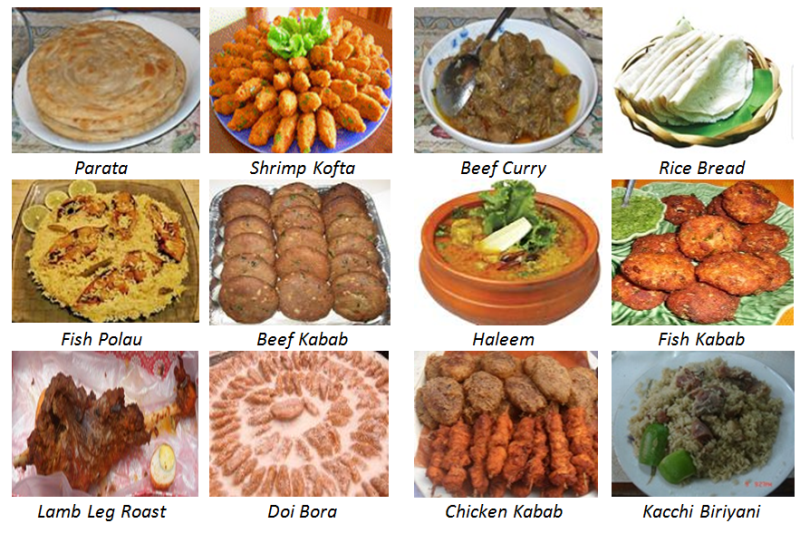
Desserts
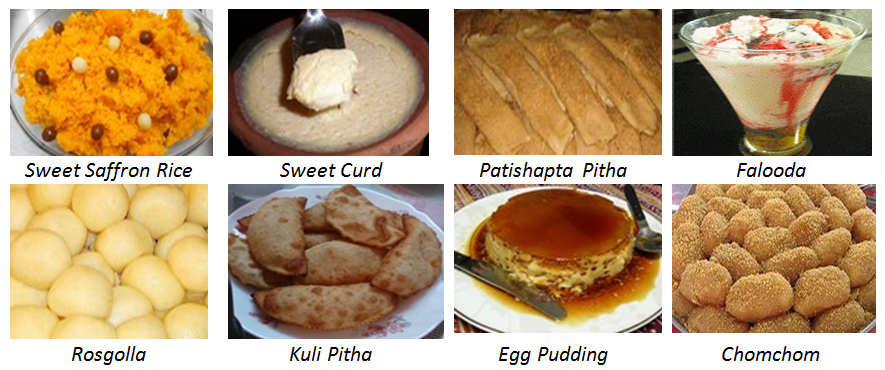
Drinks
Thanks to the diplomats and foreign business communities in Dhaka, global cuisines are at your doorstep if you are living in posh residential areas. Restaurants offering Indian, Chinese and Thai foods are all over the country. In Dhaka and Chittagong city, restaurants are sprouting up which continue to bring new varieties of global cuisines to the privileged urbanites.
While Indian, Chinese, Thai and western fast foods have become household items; Indonesian, Malaysian, Singaporean, Japanese, Korean, Italian, Mexican, Hungarian, Jamaican, Portuguese and Mediterranean cuisines are gaining popularity in Bangladesh.
Those foreign and costlier foods have become special Iftar items for a few but attracting more and more in recent time.
- Iftar boosts compassion, equality and social harmony
Most of the Muslims go to mosque to pray. The mosque is an institution that creates the best environment and boost fraternity among the Muslims. In perfect harmony and true spirit of brotherhood, standing in rows, knowing no difference among each other, they follow each step the one man ahead of them, the Imam[10], takes to express their collective devotion, gratitude and obedience to the Almighty Allah (The God), and seek His blessings.
The obligatory daily prayers bring together the Muslims five times a day.
Ramadan, in fact, increases both the number and length of their daily meetings for the whole month. In addition to five obligatory prayers, the Tarawih prayer takes more time from them and in turn provides them much more scopes than usual to cherish the bondage of brotherhood.
However, the most important and meaningful event of the day, every day during Ramadan, takes place during Iftar at the mosque: All that gather for Maghrib prayer sit together in the same settings and eat Iftar made of the same items. No difference in sitting arrangement, no difference in dishes or even ingredients. If there are among them who can’t or don’t fast, they are not discriminated against either– the meal is full of blessings of the Almighty Allah, it must be shared with all that are present or enter into the mosque during Iftar time.
Even if a non-Muslim enters into a mosque, a house, or a place where Iftar is being eaten, he/she is always treated with same care and love that one Muslim man or woman demonstrates for a fellow Muslim.
Ramadan indeed creates unique environment and opportunity for the Muslims to demonstrate compassion, cherish love and human dignity.
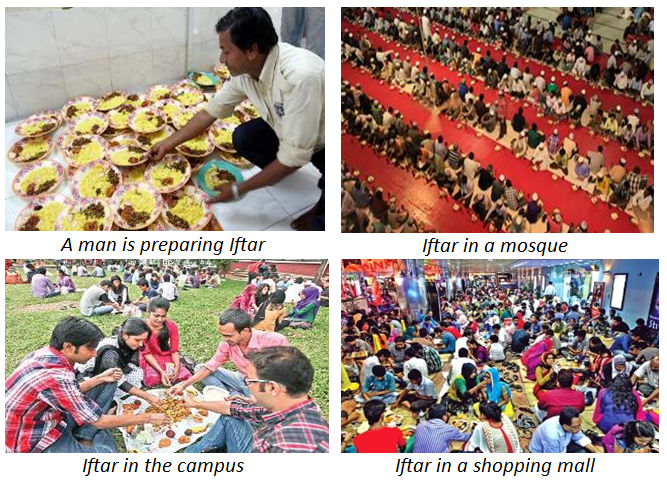
- Ramadan in politics: politics of Ramadan
Ramadan has an extra appeal to the politicians in Bangladesh regardless of their creed and craving for the Almighty God.
Ramadan is the only month when they apparently observe ‘holiday’ from hooliganism.
This is a month to play a different game: softer tone; relaxed composure; pious appearance; more compassion for business communities; intimate relationship with clerics; emotion sharing with world Muslim leaders; orphanizing (to remember and dine with the orphan for the first and last time in a calendar year), and Iftar parties!
Almost all political parties but the leftists either host or attend a number of Iftar parties during Ramadan. These parties are in fact, dining sessions with potential individuals and groups to gather support from business communities and foreign diplomats.
Most interestingly, some Muslim politicians tend to end their Ramadan holiday with a pleasure trip to Mecca!
The virtue of Hajj, the pilgrimage to Mecca, is supposed to be instrumental to the positive attitude and righteous actions of a pious Muslim. However, all those (politicians) that perform Hajj return home with renewed vengeance on (their) opposition and outrageous thirst for power.
Since Ramadan is an important religious event in Islam it is a protocol for the President and Prime Minister in Bangladesh to host ‘Iftar party’ for diplomats, parliament members and politicians, scholars, professionals, liberation war veterans, noted writers, poets, journalists, business communities, outstanding individuals in the society, and the orphans as well.
- Iftar Parties
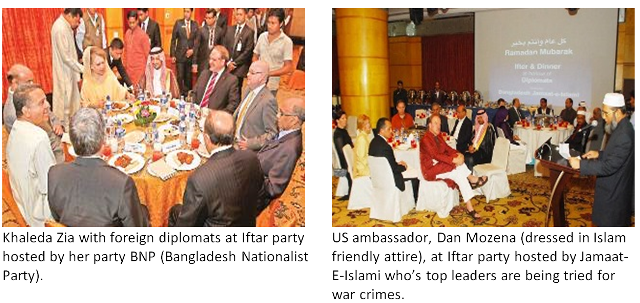
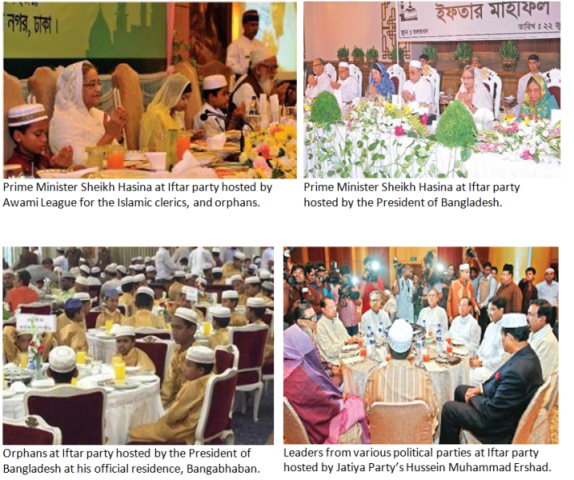
- Lailat-al-Qadr (known as Shab-E-Qadr in Bangladesh)
The night of the 26th day of Ramadan is called Lailat-al-Qadr (Arabic) or the Night of Destiny, also known as Shab-E-Qadr in Bangladesh. It is believed that Allah blesses everyone on this night, accepts all prayers and forgives all sins. In addition to the five prayers a day and Tarawih, Muslims continue to offer prayers in pairs of two and recite holy Quran throughout the night.
Sometimes, a special evening meal of rice bread, meat curry (chicken, mutton or beef), and pudding made of egg or carrot or semolina is made on Shab-E-Qadr.
Young children could be seen walking with trays filled with traditional cake and sweets and rice bread and pudding to the neighbor’s doors or to the house of their dearest one.
- Here comes the Eid!
With the end of Ramadan, the first day of the next lunar month, Shawwal, comes along with the Eid-ul-Fitr – the festival of breaking fast.
The Muslims rejoice their success of month long endurance of thirst, hunger, temptation, anger, greed, frustration, fear and sometimes, the enemy climate. At thirty five to forty degree Celsius temperature in the day, as if the sun is baking the earth, many suffer from the trauma of near death from dehydration.
The first day of Shawwal is the day of merrymaking! Atmosphere in Bangladesh becomes electric with colors and enthusiasm displayed by the jubilant people. Every one, male and female, young and old, decorates themselves with new, colorful dress and ornaments for Eid.
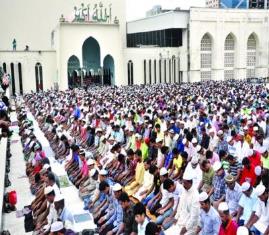
People wake up early. They will take a shower to go to Eid prayer, and they must eat breakfast before leaving the house. A special breakfast is made on Eid day with sweet saffron rice, rice vermicelli cooked with milk and sugar, traditional homemade cake, and milk tea or fruit juice. Eid prayer is very special and almost everyone joins; so it is held in huge open space. And often, if not always, a community requires to arrange for more than one prayer at the same venue to enable each of the community members to attend Eid prayer. While more than one prayers are offered, each will be led by a different Imam as the same Imam can’t lead more than one prayer.
The congregation for Eid prayer creates such a nostalgic atmosphere that no one can feel themselves a stranger. The whole community really turns out to be one family.
Once the prayer ends people start shaking hands with one another. Then they greet each other with, ‘Eid Mubarrak’ (have a blessed festival) followed by three hugs. On the prayer ground, there are no strangers; all are friends, brothers – sisters!
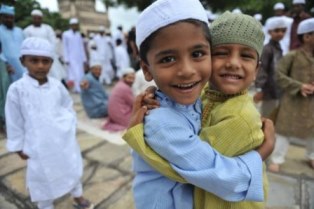
The first episode of merrymaking ends at the prayer ground, and the second begins at home on their return. At home it begins with exchange of greetings: children will bow to their parents and touch their feet three times (with right hand, take the hand back to touch their own chest or forehead, and repeat), the gesture of respect and seeking blessings. Next, they all greet each other with ‘Eid Mubarrak’ followed by three hugs. The sensational moments sink slowly in the process of parents giving Eid gifts to the children or the elders to the young ones, and proceeding to the dining table, together.
The second episode displays the typical Bangali hospitality: people visit friends and families, and eat plenty of finger licking and tongue twisting Eid special dishes along with various types of sweets and desserts. For those that are concerned with multi-folded belly or pumpkin sized tummy, there could be some consolation with non-sweetened curd, or Borhani drink (a spicy yogurt drink) during or after the meal since there is no way to escape the heavy, spicy and fatty dishes on Eid day!
The third or final episode? well, there is none!
The celebration of a successful fasting for a month doesn’t and can’t end on one day. Ramadan lasts for 29 or 30 days: every single day begins with hardship and ends in peace and joy just to put the pious Muslims into another day of hardship. Officially the month of fasting and feast in Muslim world ends with Eid-ul-Fitr – the festival of breaking the fast; and that too, consists of one day only: how and why then could there be no final episode?
The lesson Ramadan provides to every single Muslim is priceless. One that learns lessons of Ramadan continues to live as a socially responsible person: a compassionate human-being always ready to sacrifice for the betterment of the society, always humble, sharing the sufferings of others, and thankful to the Almighty Allah – the creator of all creation.
The happiness, he/she earns every evening after a successful day of fasting, is eternal. The collective joy of Eid-ul-Fitr further strengthens the family and social bondage.
Upon a month long fasting in Ramadan a Muslim man/woman learns to be humble, to appreciate every drop of water he/she drinks every day, to value each bite of food he/she eats every day, and to survive the hardship in life with dignity.
Ramadan is apparently a harsh period of time when Muslims are subject to tremendous hardship but inherently sensational, joyful, and worth celebrating.
Ramadan Mubarrak! Eid Mubarrak!
[1] Bangladesh was a part of the undivided Bengal until 1947 (wikipedia)
[2] Sylhet is a north-eastern district in Bangladesh
[3] Muhammad (peace be upon him), is the last messenger and prophet sent by Allah (God) who has restored the unaltered original monotheistic faith of Adam, Noah, Abraham, Moses, Jesus and other prophets (wikipedia). Muslims pay respect with ‘peace be upon him’ to Prophet Muhammad each time they utter his name.
[4] The Quran is a compilation of the verbal revelations from Allah to Prophet Muhammad (peace be upon him) over a period of twenty two years (www.alislam.org/quran).
[5] http://quran.com/2/185
[6] Isha is the fifth and the last of the five daily prayers which is usually prayed around 8 pm.
[7] A Rakat is the prescribed movements and words followed by the Muslims while offering prayers to Allah (Wikipedia).
[8] Fajr is the first prayer among the five daily prayers. Fajr is prayed 10-15 minutes before sunrise, usually around 4 am.
[9] The fourth prayer of the day (usually prayed between 6:40 to 7 pm).
[10] Imam is an Islamic cleric who leads daily prayers and special prayers on various occasions.
Image source: Most of the images are owned by the author, the rest were collected from various Bangla newspaper reports and articles
